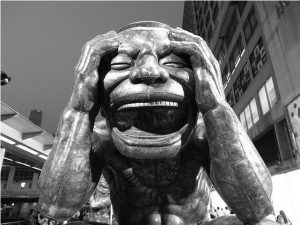By Steve Taylor Ph.D
Guest Writer for Wake Up World
To an impartial observer – say, an alien zoologist from another planet – there must be very compelling evidence that human beings suffer from a serious mental disorder, and are perhaps even insane.
The last few thousand years have been an endless catalogue of insane behaviour. Recorded history is an endless catalogue of wars, and the story of the brutal oppression of the great mass of human beings by a tiny privileged minority. The terrible oppression of women which runs through history – and which still exists in many parts of the world – is another sign of this insanity, as is the hostile, repressive attitude to sex and the body which most cultures have shared.
In addition to this insane collective behaviour, an alien zoologist might see signs of mental disorder in the way that many of us behave as individuals. He or she would be puzzled by the fact that human beings seems to find it so difficult to be happy. Why do so many people suffer from different kinds of psychological malaise – for example, depression, drug abuse, eating disorders, self-mutilation – or else spend so much time oppressed by anxieties, worries and feelings of guilt or regret, and negative emotions like jealousy and bitterness? And why do so many people seem to have an insatiable lust to possess things? Why are we prepared to go to such lengths to obtain material goods which we don’t actually need and which bring no real benefits to us? In the same way, many people have a very strong craving for status and success; they dream of being famous pop or TV stars, and try to gain respect from others by wearing particular clothes, possessing status symbols or going to certain places or behaving in a certain way. ‘Why aren’t human beings content just to be as they are?’ the observer might ask himself. ‘Why are they so driven to gain wealth and status instead of accepting their situation and living in the present moment?’
Primal and Prehistoric Peoples
However, there are many groups of people in the world who don’t seem to be touched by this insanity – or at least, who weren’t until recent times. ‘Primal’ peoples like the Australian Aborigines, the tribal peoples of Siberia, Lapland, Oceania and other isolated areas, generally had a very low level of warfare, if any at all. They also have high status for women, and are strikingly egalitarian and democratic. Almost uniformly, anthropologists have been struck by how naturally content and carefree these peoples seem, as if they are free of the psychological malaise which afflicts us.
The Over-Developed Ego
This suggests that there is a fundamental difference between us and primal or prehistoric peoples, a difference which gives rise to the collective and individual insanity which plagues us. Why should they be free of the insanity of warfare, oppression and materialism? I believe that this fundamental difference is what might be described as our ‘over-developed ego.’
We appear to have a more pronounced sense of individuality – or ego – than primal peoples. According to the anthropologist Lucien Levy-Bruhl, for example, the essential characteristic of primal peoples was their less ‘sharpened’ sense of individuality. In his words, ‘the limits of their individuality are variable and ill-defined.’ He notes that, rather than existing as self-sufficient individual entities – as we experience ourselves – their sense of identity is bound up with their community and their land. He cites reports of peoples who use the word ‘I’ when speaking of their group and others who see their land as an extension of their self, so that being forced away from their land would be tantamount to death (this is why primal peoples are often prepared to commit suicide rather than leave their lands).
The naming practices of certain peoples suggest this too. For us, a name is a permanent label which defines our individuality and autonomy. But Australian Aborigines, for example, do not have fixed names which they keep throughout their lives. Their names regularly change, and include those of other members of their tribe. Other native peoples use tekonyms – terms which describe the relationship between two people – instead of personal or kinship names. On the other hand, our sense of ego is so defined and strong that many of us experience a basic sense of separation to nature, other human beings and even our own bodies. We are self-sufficient individuals who can exist apart from the natural world, our communities and even each other.
I believe this over-developed ego is the fundamental madness from which we suffer from, and the root cause of our insane behaviour. Intense ego-consciousness is a state of suffering. It brings a basic sense of isolation, of being separate from other people and the rest of reality. We experience ourselves as fragile entities trapped inside our own heads with the rest of the world ‘out there,’ on the other side. And our egos send a constant stream of ‘thought-chatter’ through our minds, a chaos of memories, daydreams, worries and fears which disturbs our being and creates a constant state of anxiety.
In addition, because we live in our thoughts so much, we find it very difficult to live in the present, and to appreciate the reality and beauty of the world in which we live. The world becomes a dreary, half-real place, perceived through a fog of thought. As a result of this, most people feel a basic sense of incompleteness and discontent. And this negative state is the basic source of the cravings for possessions and power and status, which are a way of trying to complete ourselves and compensate for our inner discord. We try to complete ourselves – and make ourselves significant – by gaining power over other people or by collecting wealth and possessions.
And in turn, this desire for wealth and power is at the heart of warfare and oppression. But just as importantly, our strong sense of ego means that it’s difficult for us to empathise with other people. We become ‘walled off’ from them, unable to ‘feel with’ them and to experience the world from their perspective or to sense the suffering we might be causing them. We become able to oppress and exploit other people in the service of our own desires.
Perhaps the desire for wealth and power, minus the ability to empathise, is the root of warfare and the oppression of women and other social groups. Maybe it’s also the root cause of our abuse of the environment. It means that we experience a sense of ‘otherness’ to nature, and that we can’t sense its aliveness, and as a result we don’t feel any qualms about exploiting and abusing it.
Beyond the Ego
However, there is a method of healing our inner discord and transcending our insanity: through ‘transpersonal’ – or spiritual – development. The whole purpose of transpersonal development is to transcend our intensified sense of ego, to blunt its walls of separateness and quieten its chaotic thought-chatter so that we can begin to experience a new sense of inner content and a new sense of connection to the cosmos and to other beings. This is what the practice of meditation aims to do: to generate a state of inner quietness in which the ego fades away. And this is what happens when we dedicate our lives to serving others rather than following our own selfish desires: separateness begins to fall away as we develop a heightened sense of compassion, a shared sense of being with other people and other creatures.
As we transcend the intensified sense of ego, we begin to see the world as a meaningful and harmonious place. We become able to live in the moment and accept ourselves and our lives as they are, without wanting. And we also move beyond the social insanity of warfare and oppression. Since there is no discord inside us, we no longer crave for wealth and power, and now that we are no longer separate, we have the ability to empathise with other beings, and so become incapable of abusing or exploiting them. When the ego is transcended, all of the madness of human behaviour fades away, like the symptoms of a disease which has now been cured. That is the only true sanity, and perhaps the only way in which we can hope to live in peace and harmony on this planet.
Previous articles by Steve:
- A Sense of Purpose Means a Longer Life
- Empathy – The Power of Connection
- Ecocide: The Psychology of Environmental Destruction
- Happiness Comes from Giving and Helping, Not Buying and Having
- If Women Ruled the World – Is a Matriarchal Society the Solution?
About the author:
Steve Taylor holds a Ph.D in Transpersonal Psychology and is a senior lecturer in Psychology at Leeds Metropolitan University, UK. For the last three years Steve has been included in Mind, Body, Spirit magazine’s list of the ‘100 most spiritually influential living people’ (coming in at #31 in 2014).
Steve is also the author of Back to Sanity: Healing the Madness of Our Minds and The Fall: The Insanity of the Ego in Human History and the Dawning of A New Era. His books have been published in 16 languages and his research has appeared in The Journal of Transpersonal Psychology, The Journal of Consciousness Studies, The Transpersonal Psychology Review, The International Journal of Transpersonal Studies, as well as the popular media in the UK, including on BBC World TV, The Guardian, and The Independent.
Connect with Steve at StevenMTaylor.com or follow Steve at Facebook.com/SteveTaylorAuthor.

If you've ever found value in our articles, we'd greatly appreciate your support by purchasing Mindful Meditation Techniques for Kids - A Practical Guide for Adults to Empower Kids with the Gift of Inner Peace and Resilience for Life.
In the spirit of mindfulness, we encourage you to choose the paperback version. Delve into its pages away from screen glare and notifications, allowing yourself to fully immerse in the transformative practices within. The physical book enriches the learning process and serves as a tangible commitment to mindfulness, easily shared among family and friends.
Over the past few years, Wake Up World has faced significant online censorship, impacting our financial ability to stay online. Instead of soliciting donations, we're exploring win-win solutions with our readers to remain financially viable. Moving into book publishing, we hope to secure ongoing funds to continue our mission. With over 8,500 articles published in the past 13 years, we are committed to keeping our content free and accessible to everyone, without resorting to a paywall.








